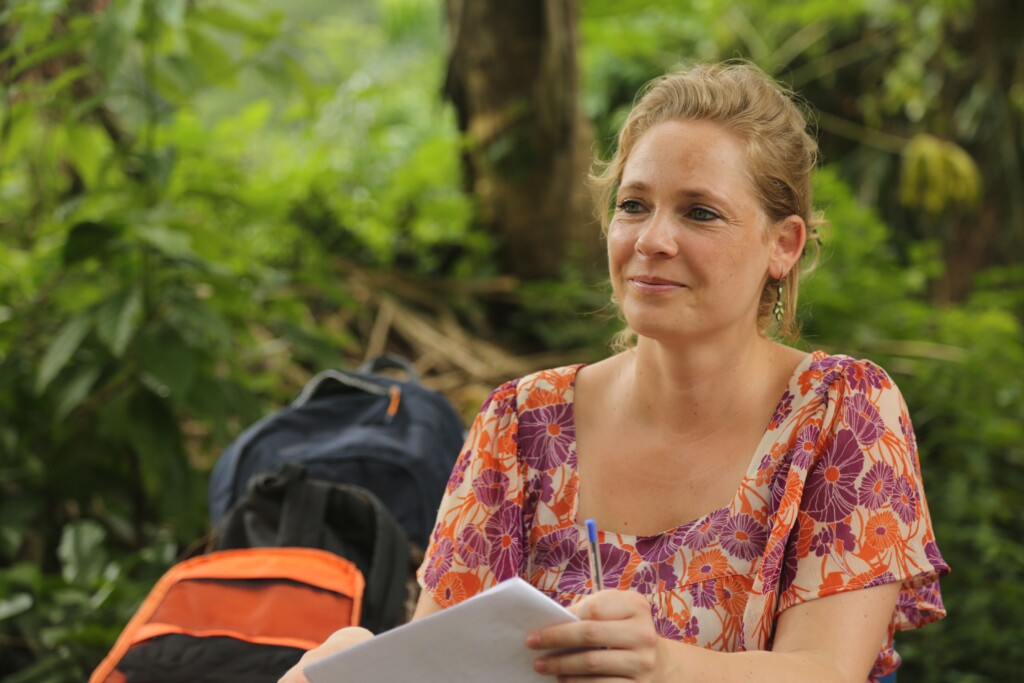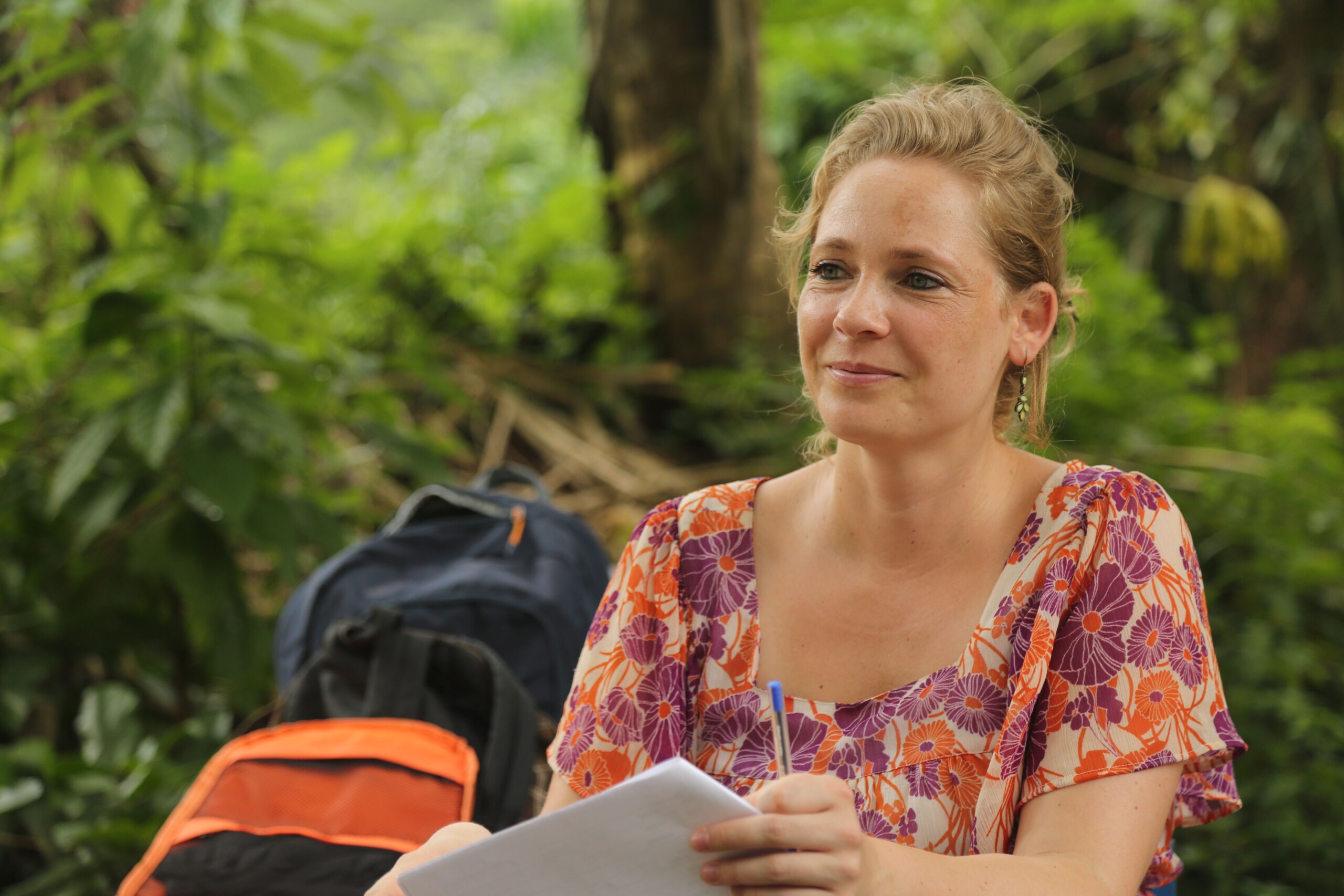“Púù yá bámbámbɔ́ bísì bà vú mɔ̀ bî — yá bálɛ́ɛ̀ mápè’è máwɔ̀.” “For our ancestors who have left us – may we keep their wisdom.”
This quote prefaces the beginning of Nadine Grimm’s “A Grammar of Gyeli,” alongside a photo of where she stayed in Ngòló, a village in southern Cameroon. There are six huts and about 25 people in Ngòló, but each is full of life, culture, and previously untapped knowledge. The photo is full of this same life.
A barefoot teenager, looking away from the camera, holds a swaddled baby in her arms. She is frozen in time, mid-adjustment of the swaddling blanket. A younger child in a stained Hello Kitty tee shirt is mid-blink; the older woman on the far right loosely balances a metal bowl between her forearm and breast as she eats.
Grimm, the sole white face in the photo, feels the most “photographed:” her earrings match her shirt, and she stares directly into the camera. This is the reality of Grimm’s style of linguistic fieldwork, one that focuses on how speakers use their language naturally in everyday life.
According to Grimm, an assistant professor of linguistics at UR who focuses on language documentation and description, the path to her award-winning comprehensive on the Gyeli language was “all by lucky accident.”
While she was pursuing a Bachelor of Arts in General Linguistics and French at the University of Bielefeld, African languages never crossed her mind. Then, offhandedly, a professor of hers mentioned difficulty in finding a research assistant for a project in Nigeria. “I was so surprised and said, ‘I’d totally come,’” Grimm said. “And he said, ‘You’re on for next summer.’”
There, she attended her first Africanist conference, which sparked a passion for African languages within her that blossomed into a master’s and Ph.D. degree with the Department of Asian and African Studies at Humboldt-Universit ̈at zu Berlin.
Her studies of the Gyeli language, a Bantu language spoken by “Pygmy” hunter-gatherers in southern Cameroon, and the Bagyeli (what Gyeli speakers call themselves), similarly came about by chance.
A future colleague Grimm met at a conference asked her to sign on to his grant proposal, noting that she could write her doctoral thesis on Gyeli. She accepted, and has since spent 19 cumulative months in Cameroon.
Grimm’s trips consisted of recording new data of the Bagyeli and processing recorded data in the nearest town to the village (half a daytrip away) with one or two Gyeli speakers at a time. Her conversations with her subjects changed over time — initially, since they did not speak French, she would converse with assistants who spoke a neighboring language to Gyeli, called Mabi, that the Bagyeli could understand.
Later, as her Gyeli improved and the Bagyeli that she became close with picked up French, they started to communicate directly. This became intrinsically important to her data-collection method.
Historically, language documentation was done by having native speakers of a language translate words and sentences and provide grammaticality judgments. However, Grimm’s fieldwork focuses on a ‘language documentation’ methodology, which is a newer approach for linguists.
“The primary data collection has a lot of overlap with ethnographic methods: observation, participation,” said Grimm. “We went on hunting trips into the forest, we were privileged to observe healing ceremonies and traditional dances, which last all night. We sat in the kitchen with the women while they were cooking and chatting.”
This technique, of building relations and showing the Bagyeli people that Grimm was “serious” about them, unlike other one-time visitors, helped her compile the reference grammar within “A Grammar of Gyeli.”
Reference grammars are integral within the field of linguistics because they cover all parts of a language, from utilized sounds to word formation and sentence structure. They serve as a basic resource for linguists and as a documentation of the culture and history that language encapsulates.
According to Grimm, we are encountering an ongoing mass extinction of languages and cultures around the world, due to forces of globalization, higher mobility, and media. While there are about 7,000 languages in the world, 50-90% of the world’s languages are currently considered endangered, and about 70% are barely (if at all) studied and documented.
Now, reference grammars of endangered languages such as Gyeli may be the only linguistic description of them before they die out. “When languages die, especially at this large scale, we lose entire knowledge systems on, for example, cultural aspects, ecological and medicinal knowledge,” said Grimm. “Linguists are losing their very research object. Speakers are losing a part of their identity.”
It is this concern that made it integral for Grimm to converse with the Gyeli speakers: to record how they use language while they build huts, go hunting, collect honey, talk about how the industrial world impacts their surroundings, and live life. Without these natural recordings of dialogue, the vivid vitality of Gyeli (as it is spoken today) could be lost to time.
In addition, despite there being about 500 Bantu languages, there are not many reference grammars for them, especially in the northwestern area of where they are often spoken. Thus, Grimm’s work also serves to facilitate understanding of the grammatical structures of Bantu languages in total.
“A Grammar of Gyeli” was the sole winner of the 2023 Bloomfield Book Award from the Linguistic Society of America (LSA).
In the announcement for the award on the LSA website, their award committee praised Grimm’s provision of primary video and audio recordings to ensure accountability for her work. “Standards in language documentation have risen over the years,” the committee said. “The LSA commends the author for keeping up with and embracing these advances.”
When asked, Grimm summarizes her fieldwork as both humbling and exciting. “I had many moments when I thought to myself, ‘I can’t believe that anyone is paying me to do this,’” she said. “Who else in the world gets to build such relations with the people and experience an entirely different culture?”



